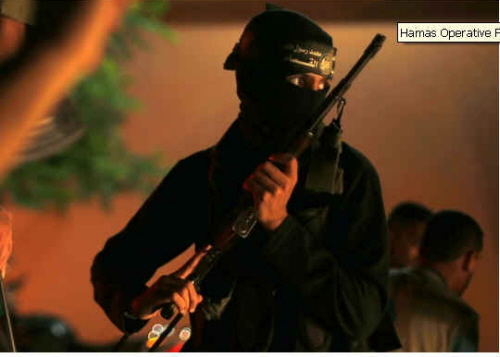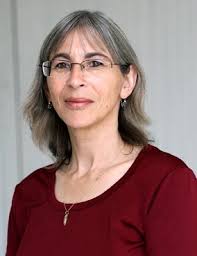Liat Collins
Tłumaczenie: Małgorzata Koraszewska
 Działacz Hamasu. (zdjęcie: REUTERS)
Działacz Hamasu. (zdjęcie: REUTERS)Świat jest pogrążony w chaosie. Kręci się szybko. Nic dziwnego, że kawałki się odrywają. Albo może tylko kręci się w mojej głowie, kiedy próbuję dotrzymać kroku wydarzeniom.
W ubiegłym tygodniu londyńska rozgłośnia radiowa poprosiła mnie o omówienie incydentu, w którym zmarł quasi-minister Autonomii Palestyńskiej, Ziad Abu Ein. Według autopsji zmarł na zawał serca wkrótce po szamotaninie z policją podczas protestu. Podkreśliłam, że “Palestyńczycy mogą zamienić go w męczennika, ale nikt nie może zamienić go w świętego”, przypomniałam, że Abu Ein został przekazany z USA do Izraela, by stanąć przed sądem za udział w zamachu terrorystycznym w 1979 r., w którym zginęło dwóch nastoletnich Izraelczyków. Został potem uwolniony w ramach wymiany więźniów.
Nie wiem, czy ten wywiad nadano, czy nie. Może producent podjął inny temat, który poruszyłam w tej rozmowie, a mianowicie, że są ważniejsze wydarzenia w naszym regionie.
Okazuje się, że są również ważniejsze wydarzenia poza regionem.
Na przykład, w tym tygodniu wszyscy patrzyli na Sydney i dramat z zakładnikami. Ten incydent, w którym były Irańczyk przetrzymywał zakładników w kawiarni Lindt, żądając flagi ISIS i zmuszając personel i klientów kawiarni do wykrzykiwania sloganów Państwa Islamskiego, nie jest w mediach opisywany jako atak terrorystyczny.
Także po śmierci Mana Harona Monisa i dwojga zakładników prasa australijska nadal mówiła o nim tylko jako o “uzbrojonym bandycie”.
Monisa opisywano jako “samotnego wilka” z niepokojącą przeszłością, włącznie z oskarżeniem o współudział w zamordowaniu byłej żony i o wysyłanie pełnych nienawiści maili do rodzin poległych żołnierzy australijskich.
Jeśli żądanie flagi Państwa Islamskiego nie jest (dosłownie) oznaką jakiegoś związku z tą sunnicko-dżihadystyczną organizacją terrorystyczną, to nie jestem pewna, co nią jest: może, kiedy zbliża się koniec roku 2014, liczy się już tylko obcięcie głowy niewiernemu i umieszczenie wideo pokazujące ten mord na YouTube.
Australijczycy, oczywiście, nie są przyzwyczajeni do zamachów terrorystycznych i mam nadzieję, że nigdy nie będą musieli rozwijać instynktu, który jest drugą naturą Izraelczyków. Większość Izraelczyków, których znam w Sydney, szybko skontaktowała się z rodzinami i przyjaciółmi, żeby zawiadomić ich, że są bezpieczni. Wysłałam SMS do byłej Brytyjki, która tam mieszka, ponieważ nie zameldowała się. Wydawała się zaskoczona, ale wzruszona gestem.
Nie sądzę, że świat w pełni zrozumiał, że jest w stanie wojny. A konflikt izraelsko-palestyński nie jest jej głównym frontem.
Bez przerwy poprawiam ludzi, którzy mówią o sześciu ofiarach Państwa Islamskiego, którym obcięto głowy.
To jest sześciu obywateli państw zachodnich, mówię. Niezliczona liczba ludzi – chrześcijan, Jazydów i muzułmanów została zabita w ten szczególnie makabryczny sposób, ale świat zachodni po prostu nie raczył tego zauważyć.
Nie chciał wiedzieć. Ofiary pozostają bezimienne.
Uzbrojeni talibowie, nazwę ich jednak terrorystami, we wtorek zmasakrowali ponad 130 uczniów i nauczycieli w szkole pakistańskiej, ale, w odróżnieniu od wypadku w Sydney, ta wiadomość nie zakłóciła normalnego nadawania programów w większości zachodnich mediów.
Na Zachodzie zabite dzieci zostaną wkrótce zapomniane, tak jak ponad 200 nigeryjskich uczennic porwanych w marcu przez Boko Haram lub jak już zapomniano 47 dzieci zabitych w zeszłym miesiącu w zamachu bombowym w Nigerii.
Rząd iracki, a raczej to, co z niego zostało, wydał we wtorek oświadczenie potępiające zamordowanie około 150 kobiet i dziewczynek w Falludży za odmowę służenia Państwu Islamskiemu jako niewolnice seksualne. To informacja podana już po publikacji instrukcji Państwa Islamskiego, jak traktować wzięte do niewoli kobiety.
Zamachy terrorystyczne mają miejsce na całym świecie, a sprawcami przytłaczającej większości z nich są muzułmanie.
Dziennikarze “Jerusalem Post” spotkali się w tym tygodniu z publicystą prestiżowego tygodnika chińskiego „Southern Weekly”. Wu Mengqi otwarcie mówił jak widzi sytuację w Izraelu i na terytoriach palestyńskich, jak również w Chinach, podkreślając swoje prawo do swobodnego wyrażania opinii.
 Liat Collins Urodzona w Wielkiej Brytanii, osiadła w Izraelu w 1979 roku i hebrajskiego uczyła się już w mundurze IDF, studiowała sinologię i stosunki międzynarodowe. Pracuje w redakcji “Jerusalem Post” od 1988 roku. Obecnie kieruje The International Jerusalem Post.
Liat Collins Urodzona w Wielkiej Brytanii, osiadła w Izraelu w 1979 roku i hebrajskiego uczyła się już w mundurze IDF, studiowała sinologię i stosunki międzynarodowe. Pracuje w redakcji “Jerusalem Post” od 1988 roku. Obecnie kieruje The International Jerusalem Post.Mówił również, że przeciętny mieszkaniec Chin jest pro-palestyński, ale ostatnio coś się zmieniło. Terror dotarł na chińskie ulice. Szalony atak nożowników na stacji Kunmong w prowincji Junnan w marcu, w którym zginęło niemal 30 osób był prawdopodobnie przeprowadzony przez muzułmańskich separatystów z regionu Sinciang, znajdującego się daleko od miejsca masakry. Ludzie stali się po nim tak nerwowi, powiedział Wu, iż grozi niebezpieczeństwo, że nawet pogłoska o zamachu może wywołać na zatłoczonej stacji popłoch i panikę z katastrofalnymi konsekwencjami.
Separatyści ujgurscy mogą nie być częścią globalnego dżihadu, ale nie ma wątpliwości, skąd czerpią inspirację.
Szkocja przeprowadziła ostatnio normalny plebiscyt, w którym mieszkańcy wypowiadali się na temat oderwania się od Zjednoczonego Królestwa; Katalończycy w Hiszpanii także przeprowadzili symboliczne głosowanie w kwestii niepodległości. Nie atakowali nikogo nożami, czy tasakami, nie obcinali głów niewinnym ofiarom podczas modlitwy, w szkole lub w drodze do pracy.
Jedną z reakcji na “nie terrorystyczny” zamach w Australii był kampania #illridewithyou oferująca wsparcie członkom miejscowej społeczności muzułmańskiej, która boi się złowrogich islamofobicznych reakcji.
Bardziej zaimponowało mi potępienie zamachu, w którym straciły życie dwie niewinne osoby, przez miejscowych przywódców muzułmańskich. Bitwę przeciwko wykorzystywaniu islamu porwanego przez grupy i organizacje terrorystyczne na całym świecie muszą prowadzić odważni, umiarkowani muzułmanie.
Wystarczy garstka terrorystów, by spowodować olbrzymie spustoszenie; dlatego tak ważne jest, by olbrzymia milcząca większość przemówiła.
Czytaj dalej tu: Widziane, słyszane, ignorowane
 Konto Twittera armii irańskiej i blog związany z Armią Irańską informują: wojska IRGC są na granicy libańsko-izraelskiej
Konto Twittera armii irańskiej i blog związany z Armią Irańską informują: wojska IRGC są na granicy libańsko-izraelskiej 25 grudnia 2014 r. na koncie Twittera związanym z Korpusem Strażników Rewolucji Islamskiej (IRGC) (@IRGCnetwork) ukazał się tweet, że żołnierze IRGC są na granicy libańsko-izraelskiej: “Żołnierze IRGC Republiki Islamskiej są na granicy okupowanej Palestyny”. Tweet zawierał zdjęcia żołnierzy z przesłoniętymi twarzami.
25 grudnia 2014 r. na koncie Twittera związanym z Korpusem Strażników Rewolucji Islamskiej (IRGC) (@IRGCnetwork) ukazał się tweet, że żołnierze IRGC są na granicy libańsko-izraelskiej: “Żołnierze IRGC Republiki Islamskiej są na granicy okupowanej Palestyny”. Tweet zawierał zdjęcia żołnierzy z przesłoniętymi twarzami.







